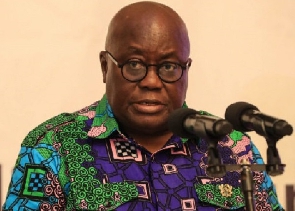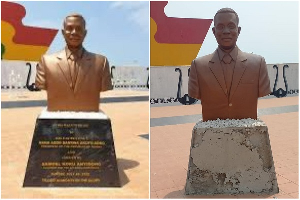President Nana Addo Dankwa Akufo-Addo on February 2, 2022, said Ghana cannot remain dependent on foreign grants and loans to keep the economy on track.
He made this comment while shooting down suggestions for his government to run to the International Monetary Fund (IMF) for financial assistance.
Speaking to some chiefs from Dzodze Traditional Area in the Volta region, he said it was prudent government devises ways to rake in some money to run the economy.
Read the full story originally published on February 2, 2022, by www.ghanaweb.com.
E-Levy will reduce our dependence on debt, Akufo-Addo
We have to find the money for our economic development, Akufo-Addo
Government holds town hall meeting on E-Levy
President Nana Addo Dankwa Akufo-Addo has shot down suggestions for his government to run to the International Monetary Fund (IMF) for financial assistance.
According to him, Ghana cannot remain dependent on foreign grants and loans to keep the economy on track.
Speaking to some chiefs from Dzodze Traditional Area in the Volta region, he said it was prudent government devises ways to rake in some money to run the economy.
President Nana Addo Dankwa Akufo-Addo noted that it is for this reason that his government is introducing E-levy.
“It will not be possible for Ghana to be forever dependent on foreign grants and foreign loans to keep our economy going. We have to find the money for our economic development and that is why it has become necessary for us to introduce these measures like this famous [electronic transaction] tax that has caused so many disputations,” he said.
It would be recalled that on November 17, 2021, Finance Minister, Ken Ofori-Atta, during the 2022 budget reading in parliament announced the introduction of a 1.75% tax on all electronic transactions.
According to him, this new directive forms part of strategies to widen the country’s tax net.
He added that the 1.75% tax is also to enhance financial inclusion and protect the vulnerable in the country.
The introduction of the E-Levy has since courted several controversies in the country, especially amongst parliamentarians and Ghanaians.
Government, on the other hand, is holding stakeholder engagement on the e-levy, explaining to Ghanaians why they have to accept the E-levy.
ESA/FNOQ
Business News of Tuesday, 2 May 2023
Source: www.ghanaweb.com

















